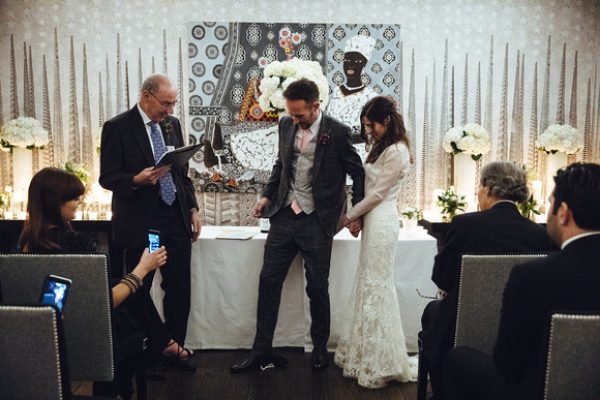
by Michael | Mar 11, 2019 | Blog
At the end of most of the ceremonies I perform, I receive positive feedback, sometimes very positive indeed. This is most pleasing, because I set out to fulfil dreams, and that can be quite a challenge! So I love to hear that my mission has been accomplished.
However, a ‘win’
is not possible in every single situation.
Two mis-matches
The preliminary chat that I hold with potential clients is vital. Just as it matters a lot for me, so it can for them.
I’m not Elvis
I had a good
discovery Skype call with a lovely couple. We got on very well, although I felt
that the groom was a bit subdued.
The couple
soon let me know that I wasn’t chosen. I was a little surprised, so I politely e-mailed
and asked them if they would tell me the reason.
“I did want to use you, but it’s my fiancé,” the bride-to-be explained. “He wants a razzamatazz wedding, and doesn’t feel that you were right for that.”
I have no
arguments with that, as that’s not really where my strengths lie. It just
underlined the value of a discovery call or, better, face-to-face meeting.
Bridezilla
On one
occasion I was discussing options for the forthcoming wedding (also on Skype) with
Kayleigh from deepest Essex. In the background I noticed a man hovering a bit,
and asked Kayleigh if that was her fiancé. She said that he was.
I invited
her to let him join our conversation.
“Oh, no,” she said earnestly, “This is my wedding. He’ll just do what I say.”
I decided
that this was not someone I wished to work with!
Communication failure no. 1
Following my home visit to discuss a funeral, the son, Peter wanted “Amazing Grace” sung at the service. This was fine, and it was agreed through the Funeral Director for the music to be played via the speakers and the words to be photocopied by Peter (so he could save a bit of money).
Unfortunately,
on the eve of the service, Peter decided to change the version of “Amazing
Grace” to Elvis’. The crematorium was advised, but I wasn’t.
Peter handed
out the words beforehand, and at the appointed time I announced the hymn.
Everyone stood.
That was
when we discovered that Elvis’s verses didn’t follow the order on the sheet,
and chaos ensued!
Had I been told, I would have checked up on YouTube and been able to prevent that mishap. Oh, well!
Communication failure no. 2
On another occasion,
I met the family (2 adult daughters and the son) to discuss the arrangements. I
took the email addresses of all three to send them the draft funeral service I
would prepare. Then they could comment and we could make any changes they
requested before the service.
When the son’s
e-mail bounced, I e-mailed a sister and explained that I must have mis-heard
the e-mail address. Would she forward the draft to her brother, please?
Of course,
she would.
Except she
didn’t.
It turns out that they were bitter enemies! Luckily, the son contacted me a day or two before the ceremony, and he was still able to contribute his feedback.
Communication failure no. 3
We had had a
rehearsal, as this was to be a big society wedding in front of 200 guests at
the Savoy. On the day, we all knew what we had to do.
I knew that
the Best Man, Ollie, would bring up the rings, but, just before we began the
ceremony, a small boy – aged about eight – called Alex came up to me. He held a
cushion (for the rings) and asked when he should bring them up. I asked if he
had the rings, and he said no. I was a bit confused, but realised that Ollie
would be doing it and I told Alex not to worry.
At the appointed moment, I called up Ollie, and there was an awful silence. Nobody came forward. I repeated Ollie’s name. The couple didn’t say a word. So it was down to me to say something!
On a hunch, I said that perhaps Alex would save the day – and he duly came up with the rings now nestling in the cushion.
Nobody had
thought to inform me that they had made this significant change!
Consequences
I’m happy to report that, even though not everything went as planned, we managed to achieve a happy result for all concerned despite the hitches. I also think I ought to point out that the vast majority of my ceremonies do go to plan – but that probably doesn’t make such interesting reading!
If you want to know more about putting together an impeccable ceremony (or virtually!), please contact me.
Do subscribe to my YouTube channel for advice and ideas for your ceremonies: https://www.youtube.com/channel/UCAn4A6oqXAHR0Gqhz0_BG-w?view_as=subscriber
Photo: www.lyndseygoddard.com
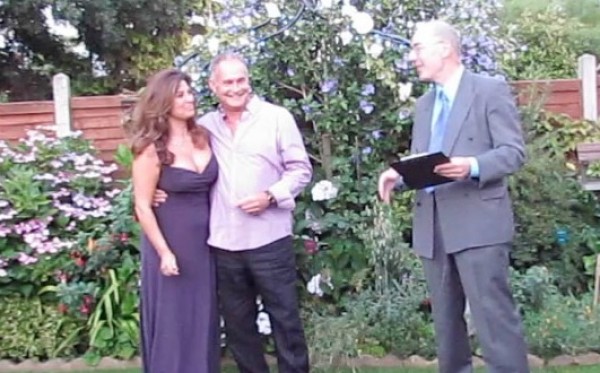
by Michael | Feb 25, 2019 | Blog
“Weddings” and “saving money” are uneasy bedfellows. They seem like paradoxes. After all, weddings often cost thousands, even tens of thousands, of pounds.
So how can “saving money” enter into the equation?
Well, there are a number of ways of cutting down on expenditure. (And I don’t mean reducing the catering to a sausage roll per guest!)
Obviously,
you can control the size of the guest list, the type of venue you use and what
you offer your guests.
Considerations
- Venue – an “at-home” event may work out a lot cheaper, although organising everything yourself can be daunting. Bear in mind that, as organiser-in-chief, you may well sacrifice peace of mind, especially on the big day. Some of the considerations will include parking, neighbours, catering, entertainment, speaker system, toilets, serving food and drink, health & safety (beware of trailing wires etc.).
Unlike with a hired venue, you should not need to book a year or so in
advance. Moreover, a home ceremony may win hands down in terms of atmosphere.
If you do hire a venue, choose a time and date that is less popular. That way, you have some bargaining power. So, apart from days like Christmas and Valentine’s Day, winter is likely to be a cheaper time, and afternoons tend to be cheaper than evenings. Your venue will be delighted to accommodate you then!
2. Registrars – unless you choose a full religious ceremony, you will need to book the registrars. Otherwise, you will not be legally married.
One convenient trick (to kill two birds with one stone) is to have the
registrars come to your venue. (Although the legislation may change soon, note
that the venue currently needs to have four solid walls and a roof to be ‘kosher’
for weddings.)
The registrars will charge around £500 (depending on the region) for
attending.
Try this canny money-saving idea: go to the Register Office yourselves (by appointment) with two witnesses before the wedding. This can be hours or even days ahead. You will only have to pay around £100 for the same ceremony you would get at the venue. You will then be legally married and free of that particular worry! So you can go to the venue of your dreams and have the ceremony of your dreams! (A Civil Celebrant can help you with a tailor-made ceremony.)
3. Booze – you can lay on some Prosecco for toasts, which can work out a lot cheaper than champagne, but just as satisfying. if you organise an afternoon reception, people tend to drink less alcohol then, so you may be able to save some money. A couple of bottles of wine per table (plus water and/or juice) should be adequate for the meal. You can operate a cash bar (make this clear to guests on the invitation!) for those who want to continue drinking.
4. Food – there is no need to serve a vast, showy repast. Three courses of decent, well-prepared staple food should do the trick. (Of course, don’t forget to cater for vegetarians and, possibly, children.) And people tend to expect rather lighter meals, if it’s earlier in the day.
5. Catering – you’ll have to decide whether you serve a buffet or have waiter-service. With a buffet, the food still needs to arrive and be replenished, although guests can serve themselves. Then there’s the clearing away and washing up etc. Silver service will cost much more, normally, but can be a lot more convenient.
With all these things, you will need to do some pricing up and comparison. However, thanks to these suggestions, you can take some real strides towards saving money on your wedding.
If I can help you further, please phone or e-mail me.
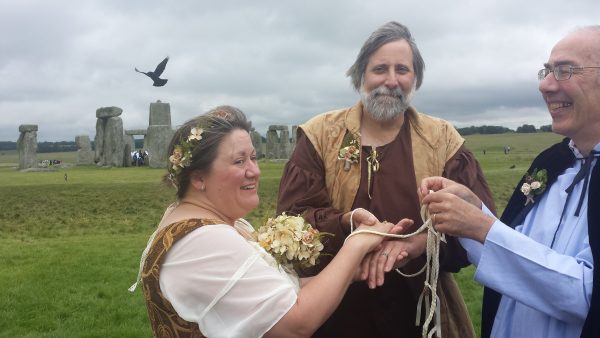
by Michael | Feb 12, 2019 | Blog
Springtime
takes place at quite different times, of course. If you are Jewish, you might
have celebrated the New Year for Trees (Tu B’Shevat). That’s a Spring festival,
but that was in January. (I suppose Springtime in Israel begins earlier than
here?)
We’ve
recently marked Valentine’s Day, which isn’t a Spring festival per se, but,
like Carnival, is viewed as being something of a harbinger of Spring. There
have been some warm days in February, so our robins have been tricked into
thinking that Spring is already here.
The Vernal
Equinox takes place in March. By definition (as “vernal” means “of the Spring”),
this is when Spring begins.
This year we
have to wait till late April for Easter. To many, that is the unofficial start
of Spring. Then at the end of the month, Beltane (a Celtic Spring festival) will
still be marked by some.
So take your
pick! Spring can start any time between January and May, although March and
April are the most popular choices.
Taking advantage
This can be a wonderful season for a ceremony. Obviously, in this country, you face the probability of a bad weather day – snow and ice are quite likely at this time – and I’ve conducted a few ceremonies in such conditions. In contrast, you may chance upon some glorious sunny days with a bit of warmth in them.
The sun and blue
skies can be so uplifting (and, of course, snow creates a fantastic atmosphere
of its own).
So, as long as you prepare for all eventualities, even an outdoor ceremony can be recommended.
You might need to provide umbrellas, carpeting, blankets and the like. Little extras such as these all add to the guests’ excitement. And nobody will forget a tempestuous day when the wind howled and the rain lashed down! (They may not enjoy it at the time, but will certainly talk of it in years to come.)
So it may well be worth having a gamble on the elements and going for a Spring ceremony. Remember, in winter, the odds are high that the day will be cold and also wet. A Summer ceremony runs the risk of sunburn/sunstroke and even thunderstorms – not to mention, gnats.
If you decide on, and I recommend it, an outdoor ceremony, feel free to speak to me and I shall be glad to help.
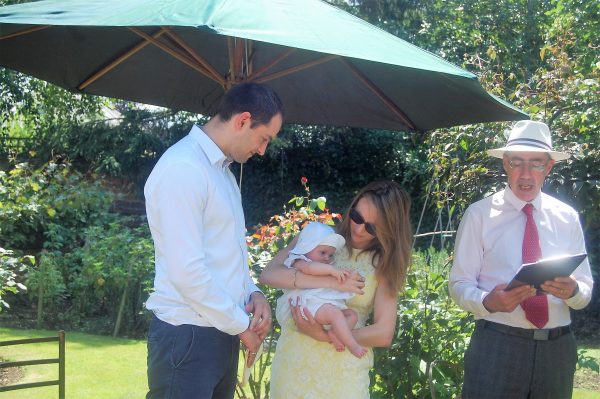
by Michael | Dec 18, 2018 | Blog
Outdoor weddings and politics make a strange combination, don’t they?
Happy Days
I love being involved in outdoor ceremonies. Of course, they’re a gamble. There’s the weather to take into account. I have conducted namings in baking sunshine and weddings in the rain. I’ve led funerals in snow and ice. The unpredictability is quite exciting, and sometimes bad weather can even enhance proceedings.
I well remember one outdoor wedding in August. The heavens suddenly opened. What was I to do? We were three quarters of the way through the ceremony. Should we stop?
But one bright spark grabbed one of the huge parasols for outside tables, and brought it to the front. He then put it up so that it sheltered the couple. (Though not the celebrant, sadly!!) It put a smile on everyone’s face and will long be remembered.
Less happy days
But I have a gripe.
I normally have minimal interest in politics. I like to think that politicians are basically well-intentioned. So I let them get on with what they’re doing. And hope they’ll allow me to do likewise.
However, I am not sure about this proposal.
According to the last budget, plans are afoot to enlarge the competences of registrars to include outside weddings. Currently, for a wedding to be legal, it needs to be conducted within four solid walls. (Only there is the registrar permitted to say the words that make the ceremony legally binding.)
The current situation
At the moment, if a couple wants an outdoor ceremony, this would be an addition, which is open to a civil celebrant to conduct. (See where this is leading?!)
So you have a couple of choices.
With two witnesses, you can go to the Register Office by appointment (hours or days) before the outdoor ceremony. You get legally married (so that concern is behind you) and then have what is to all intents and purposes your wedding, namely, the (celebrant-led) ceremony of your dreams, in the venue of your dreams.
Alternatively, the registrars can come – at quite a price – to your chosen venue and – inside – conduct the standard ceremony. The party can move outdoors afterwards for the celebrant-led ceremony.
Remember, the registrars cannot include any religious elements or mentions at all. They may offer reciting of vows and exchanging of rings, but these are not compulsory, and a celebrant can do that, tailoring these specifically to your wishes.
The future
If the proposal goes ahead, then a lot of couples will presumably spend the money (we’re currently talking £5-600) on getting the registrars over to the chosen venue. They won’t then want to pay for a civil celebrant on top of that. Even if he does personalise the event for you.
So the registrars get an extra income stream, and the celebrant potentially loses out.
I know I’m biased, but I don’t see that that change is necessary.
Yes, you will gain convenience, although how inconvenient is the current position anyway? And you won’t get a better ceremony, as it won’t be personalised. Nor will you be able to choose your registrar – you’ll get who you’re given. With a civil celebrant, you can meet him in advance and see if you like him – and whether he can present well.
I wonder whether some palms are being greased, as the advantages really are not great (except to the registrars!).
What do you think?
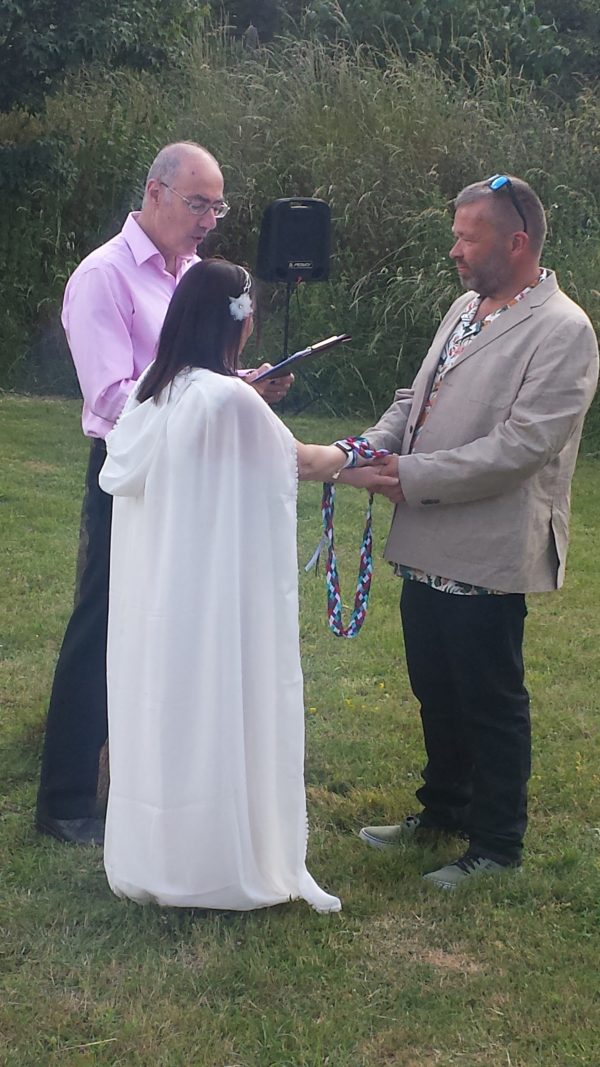
by Michael | Nov 5, 2018 | Blog
Mixed-faith ceremonies were virtually unthinkable a dozen years ago. Fortunately, we’ve moved on. They are much more accepted (and desired) nowadays.
Of course, there is a need. If a couple want to marry religiously, they may be prevented from so doing because of their church’s rules. So a Catholic divorcee will not be able to marry in Church. Same-sex ceremonies are still not accepted by many churches. Mixed-faith couples have the same problem, although some more enlightened institutions may be willing at least to bless the pair.
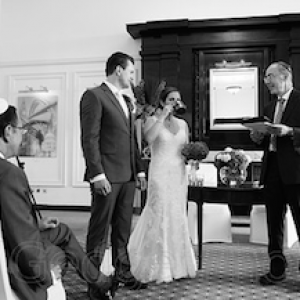 Photo: Philippa Gedge Photography
Photo: Philippa Gedge Photography
Not every mixed-faith couple wants any religion, and the Register Office may fill a gap. (Obviously, all marriages need to be registered officially in this country.) However, Register Office ceremonies are fairly standard and sometimes reek of the conveyor-belt.
An alternative can be a ceremony compiled and led by a civil celebrant (possibly, but not necessarily, a humanist). The celebrant can create a spiritual, beautiful ceremony – but such a ceremony does not have legal validity.
The Registrars’ service will be totally secular. There may be absolutely no religious mentions or readings, which may not meet the needs of the couple (or their families).
A civil celebrant will be able to meet the pair’s needs, if they want a part-religious ceremony. The celebrant may not be ordained, but can still include religious elements (usually agreed with the couple).
In fact, the civil celebrant will work with the couple to design the service that fits in with their beliefs. So it may be religious, part-religious or totally secular. It may contain rituals from a variety of religions and/or cultures.
The service will also be exactly as the couple want. It is up to them what clothes will – or will not – be worn (I have received special requests about my garb – but not, as yet, to wear a football shirt!). The couple can choose readings or poems, and also readers. There can be an address by the celebrant – checked in advance by the couple. They can have elements that they want, including the music, in the order that they want. (The celebrant may well offer advice.) They may choose to deliver their own vows. In short, absolutely everything can be approved by the couple before the day.
Logistically, there are a couple of decisions to be made.
- Should the register office ceremony take place a few hours – or a day or two – in advance? That way, the legal bit is covered by the time the couple come to the ‘real’ wedding ceremony, and they can relax and really enjoy their bespoke ceremony.
- Should the civil ceremony or blessing come straight after the legal marriage (at the same venue)? The ring blessing, for example, could be done by the civil celebrant, as could the vows. This way, the registrars could conduct a 10-15 minute ceremony, and the blessing ceremony could take around as long (depending), but cover the couple’s wishes.
The important thing on such a big day is to deliver a memorable, meaningful ceremony – one which the couple and their guests will remember fondly for months and years to come. By creating a personalised service and conducting it professionally, a good civil celebrant will ensure this.
Please ask Michael for more information.






